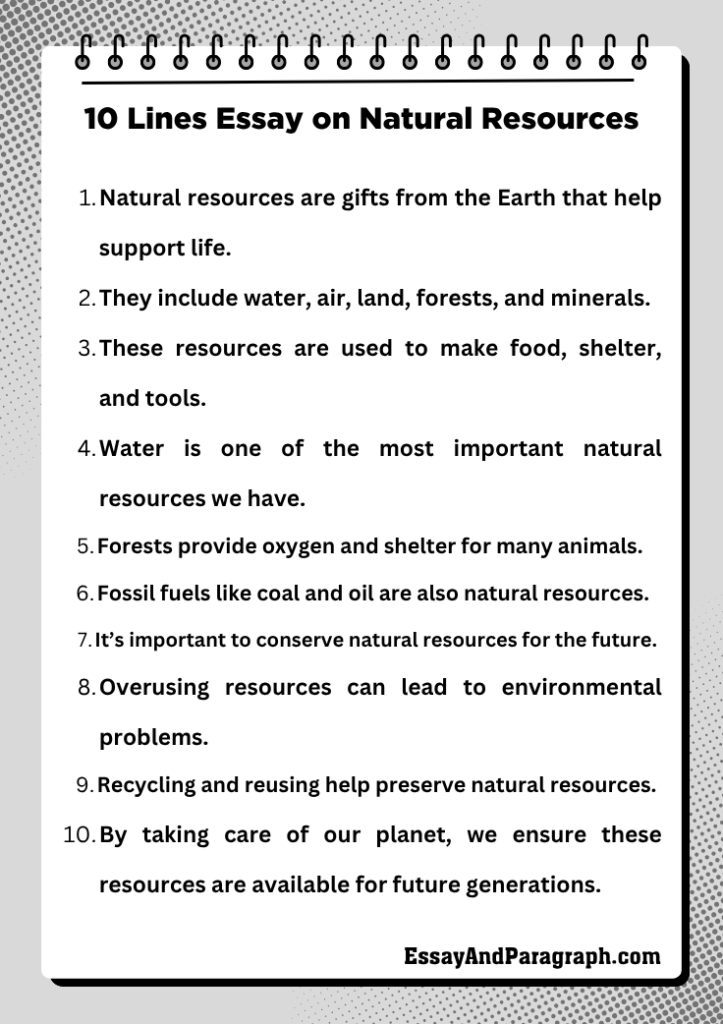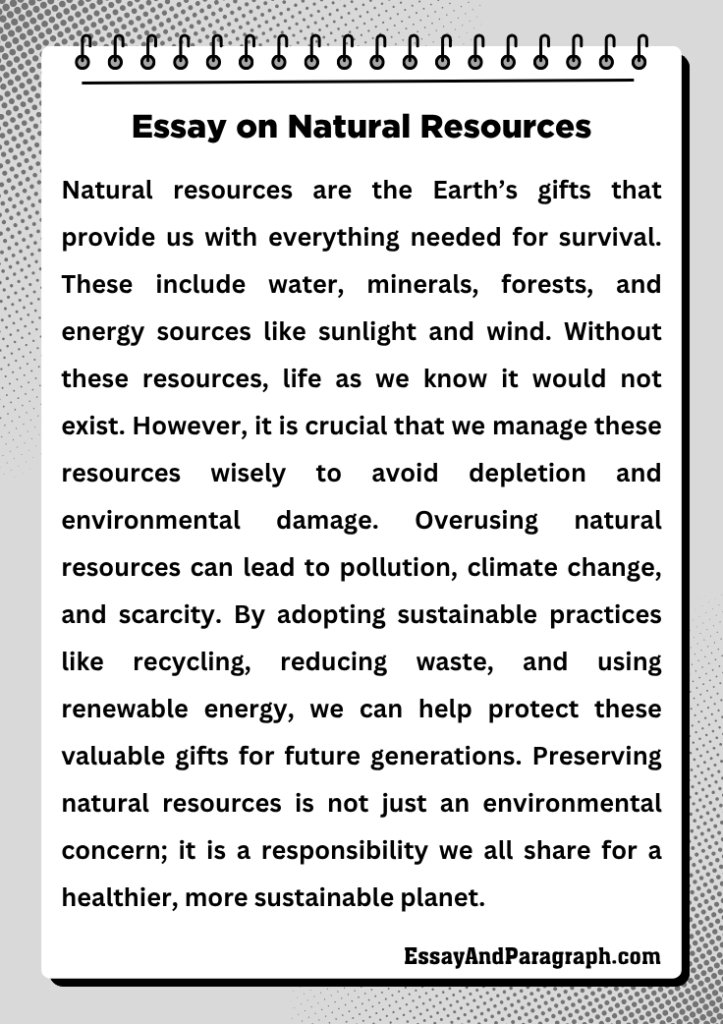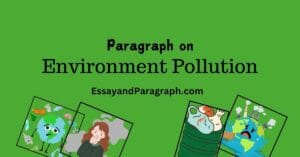Have you ever stopped to think about all the amazing things the Earth gives us? From the air we breathe to the water we drink, natural resources are the foundation of life itself. Natural resources are materials or substances found in the environment that humans and animals use to survive. They include things like water, forests, minerals, and sunlight. In this article, we will learn how to write an essay about these precious gifts and understand why they are so important for our planet’s well-being.
10 Lines Essay on Natural Resources
Natural resources are gifts from the Earth that help support life.
They include water, air, land, forests, and minerals.
These resources are used to make food, shelter, and tools.
Water is one of the most important natural resources we have.
Forests provide oxygen and shelter for many animals.
Fossil fuels like coal and oil are also natural resources.
It’s important to conserve natural resources for the future.
Overusing resources can lead to environmental problems.
Recycling and reusing help preserve natural resources.
By taking care of our planet, we ensure these resources are available for future generations.

Essay on Natural Resources – 100 Words
Natural resources are the Earth’s valuable gifts that provide everything we need to survive. They include water, air, land, minerals, and forests. These resources are used to produce food, build homes, and even generate energy. However, we need to be careful in how we use them. Overusing natural resources can lead to pollution, climate change, and the loss of biodiversity. It’s important to conserve and protect these resources by recycling and reducing waste. By doing so, we can ensure that future generations will also benefit from Earth’s natural gifts.
Short Essay on Natural Resources – 150 Words
Natural resources are the valuable gifts the Earth provides that are essential for human life and survival. These resources include air, water, minerals, forests, and fossil fuels like coal and oil. Water, for example, is necessary for drinking, farming, and generating energy. Forests offer oxygen, shelter for animals, and wood for construction. Minerals such as iron and copper are used to build everything from homes to electronics. However, these resources are finite, meaning they can be used up. Overusing or mismanaging natural resources can lead to environmental problems like pollution and climate change. It is crucial to conserve these resources by reducing waste, recycling, and using renewable energy sources such as solar and wind power. By doing so, we can ensure that future generations will also benefit from Earth’s valuable gifts and maintain a healthy, sustainable environment.
Essay on Natural Resources – 200 Words
Natural resources are the essential gifts that the Earth gives us to survive. These include water, air, sunlight, minerals, and plants. Water is one of the most crucial natural resources, needed for drinking, agriculture, and generating electricity. Air provides oxygen, and forests offer wood, shelter, and help maintain a balanced environment by absorbing carbon dioxide. The Earth also provides valuable minerals such as coal, oil, and metals like copper, which are used in industries and construction.
The problem today is that many of these resources are being used faster than they can be replenished. Overuse of fossil fuels is contributing to pollution and climate change, while overconsumption of water is causing shortages in some areas. Therefore, it’s important to conserve natural resources by practicing sustainable habits. Using renewable energy sources like wind and solar power, recycling, and reducing waste are all ways to protect the environment and ensure that these resources remain available for future generations.
By understanding the importance of natural resources and taking steps to preserve them, we can contribute to a healthier planet. This not only benefits us today but also ensures that our children and grandchildren will be able to enjoy the Earth’s valuable gifts in the future.
Essay on Natural Resources – 250 Words
Natural resources are gifts from the Earth that provide the essential materials we need for survival. These resources include water, air, land, minerals, and plants. Water, for example, is needed not only for drinking but also for irrigation, sanitation, and industrial use. Air provides us with oxygen, and forests contribute oxygen while also offering wood, shelter, and support for wildlife. Minerals like coal, oil, and natural gas are vital for energy production, transportation, and manufacturing.
These resources play an essential role in our everyday lives, but they are not unlimited. Over time, many of the Earth’s natural resources have been used up faster than they can be replenished. This is especially true for non-renewable resources such as fossil fuels. The overuse of these resources leads to environmental problems such as pollution, climate change, and resource depletion. For instance, the burning of fossil fuels has led to global warming, and the misuse of water has caused droughts in many areas of the world.
To protect these precious gifts, it’s important to conserve natural resources. This can be done through sustainable practices such as recycling, using renewable energy sources, and reducing waste. By making smarter choices about how we use resources, we can help ensure that the Earth’s natural gifts are available for future generations. In doing so, we not only preserve the environment but also create a healthier and more sustainable world for everyone.
Essay on Natural Resources – 500 Words
Natural resources are some of the most valuable gifts the Earth has provided to us. They include things like water, sunlight, air, minerals, and forests, all of which are essential for our survival. Without natural resources, human life as we know it would not be possible. They provide the basic necessities for daily life and are the backbone of industries worldwide. Water, for example, is needed not only for drinking but also for agriculture, industry, and sanitation. Forests offer oxygen, wood, and shelter, while sunlight powers solar energy systems.
Minerals such as iron, gold, and copper are used in everything from buildings to electronics. Fossil fuels like coal, oil, and natural gas are essential for transportation and electricity production. Despite their importance, these resources are finite, meaning they can be used up. It is crucial that we manage and conserve them wisely to ensure they are available for future generations.
Unfortunately, human activities often harm the environment, depleting natural resources at an alarming rate. Overfarming, deforestation, pollution, and wasteful consumption have all contributed to the exhaustion of many resources. For example, oil reserves are being used up faster than they can be replaced, leading to concerns about future energy shortages. Similarly, water resources are becoming scarcer in many parts of the world due to pollution and climate change. These challenges underscore the need for sustainable practices.
Conservation efforts are necessary to protect natural resources. Recycling, reducing waste, and using renewable energy sources such as wind and solar power are just a few ways we can make a positive impact. We can also use technology to improve how we use resources. For example, electric vehicles help reduce the need for oil, and water-saving technologies help conserve water in agriculture and homes.
It’s not just about the environment. Conserving natural resources also makes economic sense. By using resources more efficiently, we reduce costs and help create jobs in green industries. We also promote a healthier, more stable economy by investing in renewable resources and sustainable practices.
Looking ahead, it is our responsibility to ensure that we leave a better planet for future generations. By focusing on the careful management and protection of natural resources, we can continue to enjoy their benefits for many years to come. Protecting natural resources should be a priority for everyone, whether individuals, businesses, or governments. Only through collective effort can we preserve Earth’s valuable gifts.

FAQs about Natural Resources
1. What are natural resources?
Natural resources are materials or substances found in nature that are used by humans and animals. These include water, minerals, land, forests, and energy sources like sunlight, wind, and fossil fuels. These resources are essential for human survival and the functioning of economies worldwide.
2. Why are natural resources important?
Natural resources are critical because they provide everything needed for human life. Water is used for drinking and irrigation, forests give us oxygen, and minerals are necessary for constructing buildings and making technology. These resources support our health, economy, and environment.
3. How can we conserve natural resources?
We can conserve natural resources by reducing waste, recycling, and using renewable energy sources like wind and solar power. Additionally, we should focus on sustainable practices, such as using less water, planting trees, and minimizing deforestation. Being mindful of how we use resources ensures that they are available for future generations.
4. What happens if we overuse natural resources?
Overusing natural resources can lead to severe environmental problems, such as pollution, climate change, and the depletion of resources. When resources are overused, they become scarce or even extinct. For example, fossil fuels are running out, and water supplies are decreasing in some areas, making it harder for people to access these vital resources.
5. Can renewable energy help conserve natural resources?
Yes, renewable energy plays a significant role in conserving natural resources. By using wind, solar, and hydropower, we can reduce our reliance on non-renewable resources like coal, oil, and natural gas. Renewable energy sources help reduce pollution and the negative impact of resource extraction, leading to a more sustainable future.
Top 5 Quotes on Natural Resources
“The Earth is what we all have in common.” – Wendell Berry
“We won’t have a society if we destroy the environment.” – Margaret Mead
“Nature does not hurry, yet everything is accomplished.” – Lao Tzu
“The greatest threat to our planet is the belief that someone else will save it.” – Robert Swan
“What we are doing to the forests of the world is but a mirror reflection of what we are doing to ourselves and to our fellow man.” – Mahatma Gandhi
Summary :
Natural resources are the Earth’s gifts that provide us with everything needed for survival. These include water, minerals, forests, and energy sources like sunlight and wind. Without these resources, life as we know it would not exist. However, it is crucial that we manage these resources wisely to avoid depletion and environmental damage. Overusing natural resources can lead to pollution, climate change, and scarcity. By adopting sustainable practices like recycling, reducing waste, and using renewable energy, we can help protect these valuable gifts for future generations. Preserving natural resources is not just an environmental concern; it is a responsibility we all share for a healthier, more sustainable planet.










